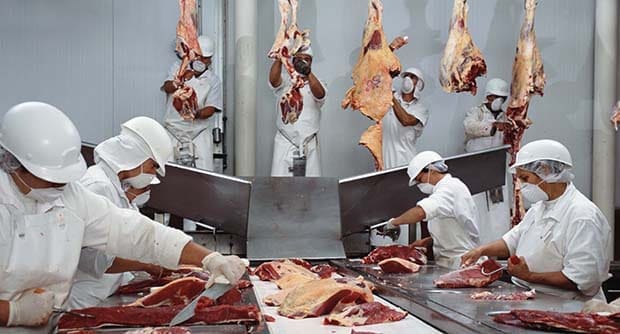
DRIVEN in part by record margins for processing cattle in the United States, JBS yesterday reported record second quarter net income and pre-tax earnings across its global beef, pork, chicken and value-adding divisions.
The world’s largest meat processor hailed the second quarter ended June 30 as the best in its history, with net revenue reaching R85.6 billion (reported in Brazilian reas) up 26.7pc on last year, and pre-tax profit of R7.1 billion (up 13pc year-on-year).
Contrasting strongly with the processing environment in Australia, the thriving red and white meat business in the US was the clear highlight in second quarter results released yesterday.
“This quarter was the best in sales, in net profit and the best in operational terms of pre-tax earnings,” Global chief executive Gilberto Tomazoni said.
The company’s five divisions – US Beef (including Australia), US Pork, Pilgrim’s Pride (US chicken), JBS Brazil and Seara (value-added), all turned substantial double-digit growth in net revenue and EBITDA compared with last year.
In North America, the quarter was marked by strong domestic and export meat demand, which supported the price of meat at historical highs and provided healthy margins for JBS processing plants across beef, chicken and pork in the US and Canada, as the effects of the pandemic subside and consumers returned to restaurants.
JBS said export sales volumes and revenues from its US and Canadian operations grew significantly from the previous year, driven primarily by shipments to China. Overall, China accounted for almost one third of JBS’s meat exports in the second quarter.
Mr Tomazoni said the second quarter result exceeded the previous record set in the second quarter last year.
US, Australian operations
Within the company’s JBS US Beef division, which includes operations in Australia and Canada, net revenue for the second quarter reached US$6.744 billion, up 21pc on the previous quarter, and a rise of 21pc on the same quarter last year. Adjusted pre-tax earnings reached US$1.397 billion, up 162pc on the previous quarter, and 23pc higher than last year.
The US beef division recorded a 10.9pc increase in volume sold and 9pc increase in average sales price, compared with Q2 last year.
“The strong demand in the domestic and international markets sustained beef prices at high levels, providing good margins for beef in the US and Canada,” Mr Tomazoni said.
In the domestic markets, demand was driven by strong retail performance and recovery of the food service channel.
For the US, China continues to lead beef exports and to date already represents 13.9pc of the total US beef exports volume, compared to 1.4pc in the same period of the previous year.
“JBS US Beef’s exports grew at a faster pace than the broader industry in the US and in Canada, with a gain in market share. Also, JBS US has been improving the sales mix through value-added programs, achieving better export results,” Mr Tomazoni said.
The price of cattle ready to be processed in the US increased compared to the previous quarter, given the growing demand and the higher number of cattle harvested in the period.
Australia and New Zealand
The performance of JBS’s beef and lamb business in Australia and New Zealand continued to be impacted by the lower availability of cattle, Mr Tomazoni said. However, Australia had been showing sequential improvement in quarterly results.
Financial results for Australia are not disclosed, but are incorporated into the broader JBS US beef division figures.
In June, JBS announced the acquisition of Australia’s second largest pork producer and processor, Rivalea, for A$175 million. The strategic acquisition would enhance JBS’s business in the region, as well as create a competitive supply advantage in raw material for the Primo Foods smallgoods division, that continues to grow production volumes and sales and produce ‘very positive results’, as a consequence of its focus on innovation and high quality products.
Last week, the company also announced its intention to acquire Huon Aquaculture – Australia’s second largest salmon producer – for A$425 million.
“This is a strategic movement that marks the entry of JBS into the aquaculture business and expands the diversification of JBS’s protein offerings,” Mr Tomazoni said.
Diversification strategy
“We have prioritised investments in our brands and added-value products by accelerating the expansion of Seara in Brazil, the new Italian specialty meats plant in the US, the acquisition of the Meats and Meals businesses of Kerry Consumer Foods in the UK, and Rivalea (pork) in Australia,” he said.
“It can also be seen in the investment in diversifying proteins, like plant-based and aquaculture, following the acquisition of Vivera in Europe, the creation of Planterra in the US, the expansion of the Incrível brand in Brazil, and the proposed acquisition of Huon Aquaculture in Australia.”
JBS said it had spent US$ 2.2 billion on acquisitions since 2020.
